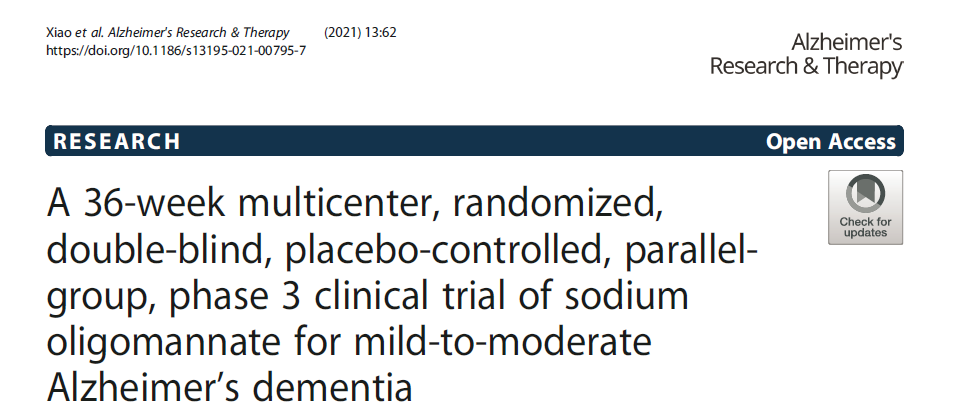
















on march 17, an article titled “a 36-week multicenter, randomized, double-blind, placebo-controlled, parallel-group, phase 3 clinical trial of sodium oligomannate for mild-to-moderate alzheimer’s dementia”, which reported the results of the china phase 3 registration clinical trial of sodium oligomannate (gv-971), a chinese invented novel drug for treating alzheimer's disease (ad), was officially published on the international peer reviewed medical journal alzheimer’s research & therapy. according to the published results, gv-971 demonstrated significant efficacy in improving cognition and showed sustained improvement across all observation periods of a 36-week.the incidence of treatment-emergent adverse events was comparable between the gv-971 treatment group and placebo group – suggested that gv-971 was safe and well-tolerated. the results met the pre-set goals of this clinical trial.
some of the principal investigators of gv-971’s china phase 3 clinical trial served as the article’s first authors and main corresponding authors. the first authors include: professor piu chan from beijing xuanwu hospital, and professors xiao shifu and wang tao from the shanghai mental health center, while professor geng meiyu from the shanghai institute of materia medica, chinese academy of sciences – one of gv-971’s key inventors, and professor zhang zhenxin from peking union medical college hospital are listed as the corresponding authors.
the article revealed the primary efficacy outcome of the clinical trial: the mean changes from baseline in adas-cog12 scores at week 36 were improved by 2.70 points for the gv-971 group and improved 0.16 points for the placebo group, with improvement (gv-971 group comparable to placebo group) of 2.54 points (p < 0.0001); and using a placebo control mean imputation method for the missing values and ancova statictics model simulation, the improvement (gv-971 group comparable to placebo group) was 2.15 points (p < 0.0001). therefore, the trial demonstrated a robust and sustained drug-placebo difference on all the endpoints between the two groups.
this phase 3 study was a 36-week multicenter, randomized, double-blind, placebo-controlled parallel-group clinical trial, aimed at evaluating the efficacy and safety of gv-971 in participants with mild-to-moderate ad. it was conducted at 34 tier-3, level 1(highest ranking in china) hospitals across china, led by the prestigious shanghai mental health center and peking union medical college hospital. wthe world’s one of the largest cro firm iqvia (formerly quintiles and ims health, inc.) managed the execution of the trial. 818 subjects with mild-to-moderate ad were randomized (1:1 ratio), to receive gv-971 (450 mg, b.i.d.) or placebo. they were aged 50–85 years of age, with a mmse score from 11 to 26.
ad is the most common neurodegenerative disease with long course, complex pathogenesis and associated with multiple high risk factors. as its pathogenesis remains unclear, the drug development has been very challendging and the current drugs marketed have limited clinical benefit. according to the report by phrma in 2018, there were only 6 approved drugs for the treatment of ad globally before gv-971’s launch, and those drugs are not able to change the course of disease. over the past 20 years, major pharmaceutical companies around the world have invested hundreds of billions of dollars in researching and developing drugs that treat ad: more than 320 of them entered the clinical trial stage but all failed, suggesting that there are limitations in the current single-target approach in the drug development that mostly focuses on brain amyloid-β (aβ) deposition and tau protein aggregation.
gv-971 is an orally administered mixture of acidic linear oligosaccharides derived from marine brown algae. preclinical studies show that the novel mechanism of action of gv-971 is related to its targetingthe gut-brain axis, which may provide an important scientific basis for the deep- understanding of its efficacy, and provide a new scientific perspective on the pathogenesis research and treatment solution for chronic and complex diseases such as ad under the holistic views.
non-clinical studies have also shown that gv-971 can reduce peripheral and central inflammation by reconditioning dysbiosis of gut microbiota and inhibiting the abnormal increase of intestinal flora metabolites. in addition, the drug can directly bind to multiple subregions of aβ to inhibit aβ deposition in the brain.
when commenting on the trial data, professor xiao shifu, who is the director of the department of geriatric psychiatry at the shanghai mental health center, a principal investigator of gv-971’s china phase 3 clinical trial and a first author of the phase 3 article, noted: “data of this study showed that gv-971 can continuously improve ad patients’ cognitive function, while non-clinical research results further support that gv-971 can not only improve ad symptoms, but also have the potential to alter the course of disease. in animal models, we can observe significantly improved gut microbiota and greatly reduced neuroinflammation after a one-month administration of gv-971. in simple words, during our clinical trial, we were able to observe the early therapeutic effect of gv-971 within just four weeks. the effect on aβ deposition requires a longer exposure but could work synergistically with the effect on the gut mirobiota and neuroinflammation. the rapid decline in the placebo group at the end of the trial and the sustained response to gv-971 during the course of the trials contribute to the growing drug-placebo difference as the trial progressed.”
professor geng meiyu, the leading inventor of the drug at the chinese academy of sciences shanghai institute of materia medica and a corresponding author of the phase 3 article, said: “the evidences support the hypothesis that the interaction between imbalanced gut microbiota, neuroinflammation, aβ deposition and tau hyperphosphorylation will accelerate the progression of ad. the therapeutic effects of gv-971 on imbalanced gut microbiota, neuroinflammation and aβ deposition can improve ad’s pathological cascade reactions, therefore improving symptoms and delaying disease progression to bring long-term benefits to patients.”
dr. guo tong, a statistics expert who is also a member of the expert team of gv-971’s china phase 3 clinical trial and former vp of iqvia greater china, stated: “gv-971’s china phase 3 clinical trial was carried out in complete compliance with the international conference on harmonization (ich) good clinical practice (gcp) guideline, and was managed and executed by iqvia, which strictly organized and oversaw all stages to ensure the rigor and authenticity of the trial as well as the scientificity of its results.”
to date, gv-971 has sequentially obtained approval from drug administrations in nine countries and regions including the us fda as well as those in canada, france and the chinese mainland, to start the global phase 3 clinical trial, with the first global case of patient randomized and dosed successfully on february 3, 2021.
its novel mechanism of action on the gut-brain axis is expected to be further verified in the already launched global phase 3 clinical trial.
compared with the nine-month phase 3 clinical trial in china, gv-971’s global clinical trial has been designed with an extended double-blind trial period of 12 months, which will help further verify the continuity of gv-971’s efficacy in improving patient’s cognitive function. at the same time, a series of biomarker test results including plasma aβ levels and phosphorylated tau protein levels will be collected to help verify gv-971’s mechanism of action, and explore the novel drug’s potentials of altering the course of ad.






